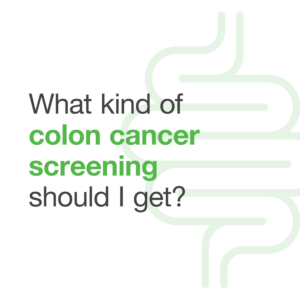National Harbor Doctors’ Office (125 Potomac Passage, Suite 250, National Harbor, MD 20745) will be transitioning to telehealth-only appointments.
Southern Maryland Endoscopy Center (125 Potomac Passage, Suite 200, National Harbor, MD 20745) will be rescheduling all appointments
Colon Cancer Prevention
When it comes to cancer, preventing it should always be the goal. Most colorectal cancers begin as polyps. Finding, quantifying, localizing, and removing polyps through screening colonoscopy is the most effective strategy to prevent colorectal cancer.
Colorectal Cancer Screening Options
The American Cancer Society (ACS) recommends that all adults with an average risk of colorectal cancer undergo regular screening using one of the tests described below. Learn more about colorectal cancer screening tests on the ACS website.

Can’t decide between colonoscopy and Cologuard? We have you covered. Download this info sheet to help you choose. Our experts can also recommend a test that fits your needs
Stool teting: FIT, FOBT or Stool DNA
Stool testing methods such as FIT, FOBT, and Stool DNA are used for detecting colorectal cancer and adenomas. FIT and FOBT are recommended annually, while Stool DNA is recommended every three years. These tests are convenient as they do not require bowel preparation and can be done at home. Of the three, Stool DNA has the highest accuracy in detecting cancer and adenomas but may produce false positives, necessitating a follow-up colonoscopy. Adherence to the recommended testing schedule is crucial, as many people fail to do so, increasing their risk. It is important to note that these tests are not therapeutic; a positive result requires a colonoscopy.
Flexible Sigmoidoscopy
Flexible sigmoidoscopy is recommended every five years for colorectal screening. This procedure requires less preparation and does not need anesthesia. However, it only visualizes part of the colon, so some polyps and cancers may be missed. Although the risk is low, it is inherent in all medical procedures.
CT Colonoscopy
CT colonography, recommended every five years, offers performance comparable to a colonoscopy for colorectal screening. It involves exposure to low-dose radiation and requires bowel preparation. Positive findings from this test necessitate a follow-up colonoscopy. However, it is often not covered by insurance.
LGI-Flag
Capital Digestive Care offers LGI-Flag, a predictive modeling tool that uses clinical data to identify individuals at risk for lower GI disorders, such as irritable bowel syndrome (IBS), inflammatory bowel diseases (IBD), and colorectal cancer. This tool helps in determining which patients may require screening, aiming to provide a personalized, convenient, and predictive continuum of care for better health outcomes. Capital Digestive Care is the only U.S.-based practice offering LGI-Flag through the Roche navify® Algorithm Suite.
Who should take action?
- Men & women age 45 and older who have an average risk of colorectal cancer. Because colorectal cancer affects African Americans more than any other ethnic group, screening is especially important. The American Cancer Society defines average risk as no family history of colorectal cancer and no personal history of colon polyps, colorectal cancer, inflammatory bowel disease or hereditary conditions that may increase your risk
- Anyone with a personal or family history of colon polyps or colorectal cancer or certain health conditions such as inflammatory bowel disease or Lynch syndrome. Some people should be screened before age 45. Talk to your doctor if you have certain conditions that may increase your risk.
- Talk to your doctor if you have certain conditions that may increase your risk.
Colorectal Cancer Screening Tool
Common Concerns
Most insurance plans cover colorectal cancer screening without applying co-pays or deductibles. If you do not have insurance, there are state assistance programs and non-profit organizations that can help.
When under the care of a trained professional, a colonoscopy is a very safe procedure with serious complications occurring in less than 1% of patients.
How to Prepare
- A thorough exam and consultation with a gastroenterologist is the best, first step ahead of scheduling a colon cancer screening test of any kind. Your doctor will assess your individual risk, based on your personal and family history and help you choose the right test.
- Most people choose to schedule a colonoscopy because it not only identifies pre-cancerous colon polyps but allows your doctor to remove them at the same time. You can schedule your procedure on the day of your consultation.
- Preparing for a colonoscopy is an important step and allows your doctor to clearly see the structure of your colon. Your doctor’s office will provide you with the information you need to prepare.